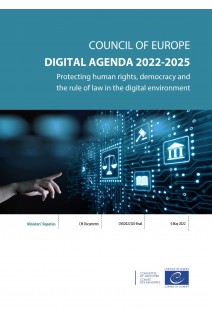The global digital transition is a reality in all areas, simplifying our daily lives - whether it is crossing a border with a digital vaccine passport, taking a distance learning course, shopping or communicating with family and friends.
The role of the Council of Europe in this landscape is clear, and it as been tackling the issue head on for years. As the guardian of human rights, democracy and the rule of law in Europe, it is its responsibility to ensure - through the standards it developps, and through its monitoring and co-operation activities - that these fundamental values are protected in the digital environment, as much as they are outside it.
All priority actions identified boil down to three main, Organisation-wide objectives:
- Consolidating the existing digital regulation by supporting the implementation of Council of Europe standards to have a coherent set of effective legal mechanisms to protects human rights, democracy and the rule of law in the digital environment;
- Responding to new challenges raised and taking advantage of the opportunities provided by emerging digital technologies by developing new legal instruments, and/or adapting und updating existing ones as appropriate, to help membr states to meet present and future challenges raised by the digital transition and to do so in line with Council of Europe standards;
- Accompanying member states for a digital transition with European values based on Council of Europe standards, through monitoring and co-operation activities.
I. IntroductionII. Adressing the Council of Europe's key strategic priorities in the digital environment
Implementing the European Convention on Human Rights
Ensuring freedom of expression, both online and offline
Fighting growing social inequalities and poverty
Non-discrimination and ensuring the protection of vulnerable groups
Fighting inequality, racism, xenophobia and discrimination on grounds of religion or belief or any other ground
Independence, efficiency and resilience of the judicial system of our member states
Fight against corruption and money laundering as well as combating cybercrime
Fight against human trafficking
Artificial intelligence
Fight against environmental degradation and climate change
Education for democratic citizenship and empowerment, and strenghtening of young people's role in decision making
III. Implementation and working methods




